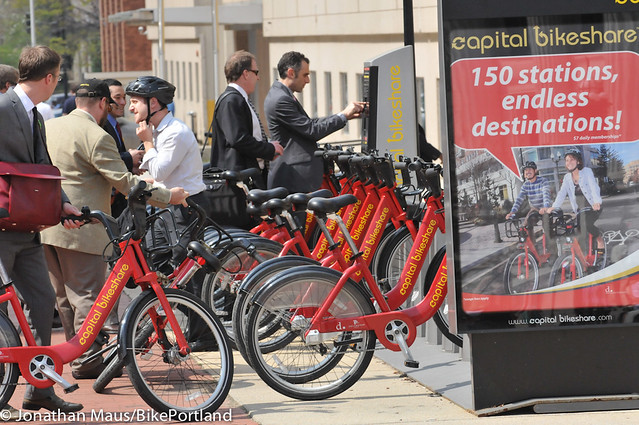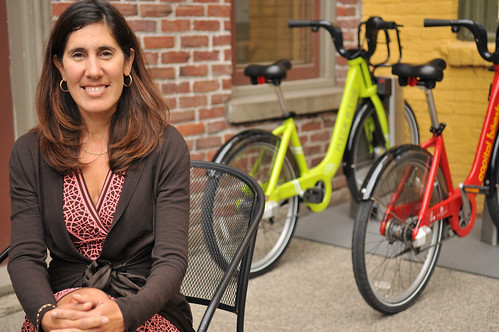
(Photos by J. Maus/BikePortland)
You might have heard by now: A local bike business that bootstrapped its way to the national stage, and then suffered a dizzying series of problems, has sold.
Alta Bicycle Share, a startup that unexpectedly became much larger than the bike planning company that birthed it after launching popular and successful systems in Boston and Washington DC, announced Tuesday that it has been purchased by New York City real estate developer REQX Ventures.
Terms of the deal haven’t been disclosed. In July, the Wall Street Journal pegged the deal at $40 million, but it’s not clear whether any of that money went to Alta’s founders or will be invested directly into the company. It’s also not clear whether Alta’s six cofounders (including local executive and former Portland bicycle coordinator Mia Birk) retain any ownership in the firm.
In July, Capital New York (the first to report on this deal) reported that 51 percent of the company was in talks to be sold. This came after news that NYC’s Citi Bike system had been operating in the red despite its popularity.
Whatever the case, the cofounders of Alta Bicycle Share still own and operate their separate company, Alta Planning + Design. That company has 150 employees worldwide and remains headquartered in Portland.
Tuesday’s announcement will have no immediate effect on Portland’s theoretical deal with Alta to launch a similar 750-bike system in Portland. As we reported this spring, Portland had reached verbal agreements with a private sponsor and was days away from a launch announcement before backing off amid concerns that Alta wouldn’t come up with working equipment for a local system.

here outside her southeast Portland office in
September 2013, one day after the company signed
a $60 million contract with New York City.
Those hardware and software problems, in turn, emerged from the privately owned Alta’s lack of working capital and from the fact that Alta’s exclusive supplier, Montreal-based PBSC, wasn’t able to operate profitably.
It’s possible that the entrance of REQX into the bike share business will inject money into a company that has been treading water for the last year despite rising demand for its service among U.S. cities and their residents. It’s also possible that REQX, a major New York developer, will invest only enough to hold on to Alta’s existing contracts without making efforts to further evolve the business.
On that front, the most hopeful news Tuesday might be the selection of Jay Walder to take over leadership of Alta Bicycle Share. Walder was a successful executive at Transport for London before coming to New York City to run that city’s transit agency, the country’s largest.
As CEO of the MTA, Walder earned $350,000 a year. In 2011, he moved to a job running Hong Kong’s private transit system, where he earned the equivalent of $950,000. So it’s likely that Walder’s hire is a major investment by REQX and a vote of confidence in his ability to grow the bike sharing business.
“It sounds like they’re going to be making more investment into the company, which is great,” said Paul DeMaio of MetroBike, a bikesharing consultant and contractor for Arlington County, Virginia, which co-owns Alta affiliate Capital Bikeshare, in an interview. “They’re getting quality candidates to take some of the corporate roles. … I just hope that they continue to evolve and make improvements.”
Advertisement
Here are some interesting tidbits from the recent flurry of media coverage.
From the New York Daily News:
Alta, the troubled operator of Citi Bike, sold its stake in the bike share company to REQX Ventures, a real estate company. Prices for an annual membership are expected to jump from $95 a year to $145.
Alta had struggled to make a profit with Citi Bike, the largest bike share program in the country. City officials had refused to greenlight hikes in the program unless new management was brought in.
The company is also benefiting from a whopping $70.5 million cash infusion from its prime corporate sponsor Citi Bank. That added capital brings the financial company’s investment in the program – which costs tax payers nothing – up to $111.5 million.
The Portland Mercury, which last Friday was the first local outlet to share news that a deal was nigh:
Internal Portland Bureau of Transportation documents obtained by the Mercury show Mia Birk, Portland’s former bike coordinator and vice president of Alta Bicycle Share, presented details about the acquisition by REQX in early August. Birk’s presentation apparently touted millions in “upfront new investment” to the company once REQX held the reins, but it appears that’s largely focused on New York’s CitiBike system. Birk’s presentation also mentioned the “building of a sales and marketing team to drive additional corporate sponsorships,” which could be great, if it means someone can find Portland sponsors.
Portland Business Journal, writing today:
Mia Birk said Tuesday that selling the bicycle share business will allow the company [Alta Planning + Design] to refocus on its original mission — facilitating bicycling by creating paths and corridors.
The 150-person company operates from 27 offices, with Portland as its headquarters. Its current projects include bike paths, projects to create protected bike lanes on city streets and sustainable transportation campaigns.
Birk said she loved working on bicycle sharing projects but it’s time to turn the reigns over to a well-funded organization with the connections needed to make the systems work. The 10 bicycle share systems now operating in the U.S. depend on sponsors to foot much of the cost.
The Oregonian, today:
[Portand Bureau of Transportation Spokesman Dylan] Rivera declined to comment about when – or if – the city hopes to launch a bike-share program that is supposed to be funded with a $2 million federal grant and $2 million from local sponsors.
“We’re still involved in an ongoing process to monitor other bike-share programs to see what makes them more successful and less successful,” he said. “We’re continuing to do our due diligence.”
Three years ago, as Alta celebrated the news of their big contract with New York City, Birk called it a “game-changer.” It turns out that was true — although probably not completely in the way she envisioned.
Here at BikePortland, we’re hoping that the willingness of two major New York companies is (like the entry of new companies into the bike share marketplace) a sign that the bike share business model in the United States is on its way out of an endearing but awkward adolescence.
Correction 10/29: An earlier version of this post incorrectly described Paul DeMaio’s relationship to Alta Bicycle Share.


